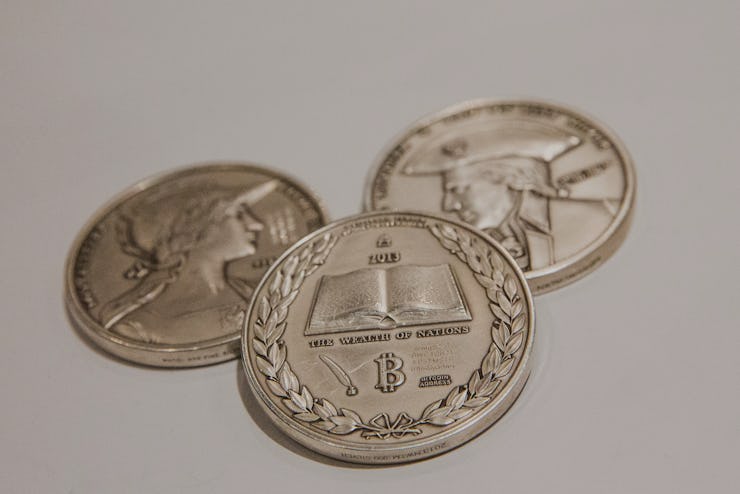What is Bitcoin Cash? What the Cryptocurrency's Hard Fork Could Mean
Today, bitcoin goes two ways.

On Tuesday morning, bitcoin analysts woke up to witness the birth of a new currency. After a hard fork — or irreversible split — the world’s largest cryptocurrency now has an upstart brother called Bitcoin Cash, a new monetary system that’s making a controversial attempt to solve bitcoin’s biggest problem.
Bitcoin Cash forked from the existing bitcoin blockchain at 8:20 a.m. Eastern on Tuesday, after a two-year ideological and technical battle over the future of the cryptocurrency. At 8 p.m. Monday night, a consensus of bitcoin’s miners agreed to ignore blocks mined by groups that did not support Segregated Witness, a technological fix that aimed to increase the speed of bitcoin transactions and reinvigorate the cryptocurrency. But a certain faction of miners wanted a more dramatic change than SegWit, and proposed a new currency, built on bitcoin’s existing blockchain, that they saw as a new and improved version of the technology.
Enter Bitcoin Cash, or BCH, a new cryptocurrency based on the bitcoin blockchain but diverging from it significantly from here on out.
Why Bitcoin Cash?
Bitcoin’s biggest problem is that the size of its blocks — the units that make up bitcoin’s blockchain — is too small, only one megabyte of data. Bitcoin Cash will have eight megabyte blocks, and various other differences. But when the blocks get bigger, they also get harder to mine, as the increased data size means larger blocks favor users and miners with more powerful computing networks. ViaBTC and Bitmain, two of the largest bitcoin mining pools — linked computer networks mining together as a conglomerate — announced quickly that they would support Bitcoin Cash.
See also: When Will Bitcoin Fork, and What’s It Mean For Crypto’s Future?
Users insert money into a Bitcoin ATM.
How Much is it Worth?
Right now, Bitcoin Cash is theoretically worth about $315 per token. But over the next day or so, the value of both bitcoin and bitcoin cash will likely fluctuate wildly. Bitcoin is currently around $2,726. The interesting thing is that because Bitcoin Cash uses bitcoin’s existing transaction record, everyone who owns bitcoin also owns the same number of Bitcoin Cash. So if you had 10 bitcoin to your name on Tuesday morning, you now also have 10 Bitcoin Cash tokens. The idea is that the split will balance out — the value of Bitcoin Cash will be deducted from the value of bitcoin. Experts, however, don’t think it’ll be dramatic — as CoinTelegraph notes it’s unlikely that bitcoin is going to drop to around $2,400 in a day. Still, the next few days are going to be tumultuous, meaning most shrewd bitcoin owners will probably just try to chill out and weather the storm.
What does this mean for bitcoin?
While Bitcoin Cash is a relatively unprecedented development (there have been other spinoffs attempted, but none that succeeded), experts say it won’t fundamentally disrupt the stability of the original currency.
“As it looks today, on August 1, Bitcoin Cash will become completely separate currency with separate leadership, which is exactly how it usually works in opensource projects when someone disagrees with project development,” Marek Palatinus, the CEO of Satoshi Labs, a bitcoin security hardware and software firm, told Inverse. “I see the rise of Bitcoin Cash as an opportunity for both camps to realize their dreams about ideal cryptocurrency. Let the market decide who’s right.”
Palatinus described the fork as a “peaceful split,” in which the people behind Bitcoin Cash made sure to add the proper digital protections to keep bitcoin and BCH transactions from mixing together after the fork.
How is the Bitcoin Cash fork different from the other possible fork?
During the past month, bitcoin users debated several plans to fix the currency’s transaction speed problem. One of these plans, called SegWit 2X, would force a hard fork where miners and users were forced to either update to a different system or continue on the old one, which was incompatible. The fact that SegWit 2X wasn’t backward compatible meant that many miners not capable of implementing or unwilling to implement the plan would be left to keep using the old bitcoin, creating two parallel currencies (like Bitcoin Cash, SegWit 2x would increase the processing demands for a lot of miners). But thanks to BIP 91, a software fix that should lock in the SegWit protocols (the original fix that makes blocks faster, but not bigger), it appears that that fork has been avoided, something experts called a “unilaterally positive change.” Bitcoin Cash, however, has still gone ahead and forked. Now we just have to watch and see if it pays off.